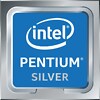Intel Pentium Silver N5030
Compare 2 Laptops with Intel Pentium Silver N5030

Compare 2 Laptops with Intel Pentium Silver N5030
Intel Pentium N5030
The Intel Pentium N5030 is an entry-level processor that works with four cores and was released in Q4 2019. It belongs to the Gemini Lake platform. It is mainly installed in inexpensive notebooks, such as the Acer Chromebook. The cores operate at clock speeds between 1.1 and 3.2 GHz. However, the 3.2 GHz is only achieved in the single-core burst. Like the majority of Gemini Lake processors, it is produced using the 14nm process. The performance is heavily dependent on the cooling. An average of 2 GHz can be expected for each core. Despite its characterization as an entry-level processor, office work and multitasking are possible with this processor.
Only available in a team
The N5030 is supported by an Intel UHD Graphics 605, which is compatible with DirectX 12 and works with a DDR4 memory controller. The GPU operates at 750 MHz and enables a maximum resolution of 1920x1080 at 60 Hz. Both the processor and GPU are unsuitable for current games. There is also no model with a dedicated GPU, which makes the N5030 a pure multimedia processor. If you are looking for or need more power, you should take a look at the mid-range processors.
Energy saving made easy
The power consumption is specified by Intel as 6 watts, which enables passive cooling, although this depends on the model. The low power consumption also makes the CPU attractive for smaller notebooks (<14") and convertibles.
The Intel Pentium N5030 represents a significant increase in performance compared to the previous model, but despite its good single-core performance, it cannot hold a candle to any mid-range processor.
| Release date | 01.11.19 |
| Codename | Gemini Lake |
| Clock frequency | 1.1 GHz |
| Boost clock frequency | 3.1 GHz |
| Number of cores | 4 |
| Threads | 4 |
| L2 cache | 4 MB |
| Manufacturing technology | 14 nm |
| Internal graphics | Intel UHD Graphics 605 |
| GPU Frequency | 750 MHz |
| TDP | 6 Watt |
| Memory Support | DDR4 / LPDDR4 |